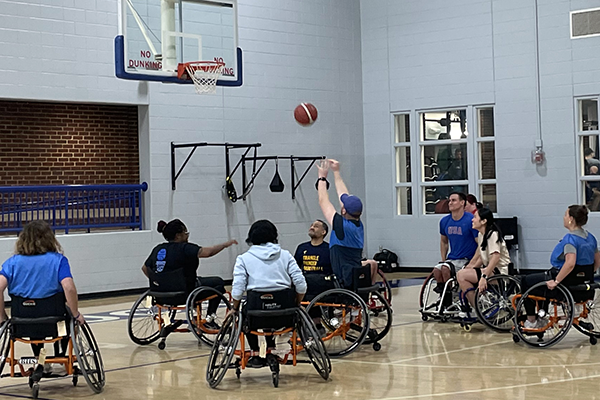
DPT students teamed up with OTD and PA students to play and observe wheelchair basketball, seated volleyball, boccia, and more during the Adapted Sports Experience (ASE), a fun educational event on Duke’s campus.
ASE partners with a local non-profit, Bridge II Sports, which provides equipment and expertise in adapted sports and recreation. The event drew athletes from the local area and as far away as Atlanta who volunteered their time to help educate our students.
The Impact of Adapted Sports
On average, persons with disabilities in the U.S. are not achieving the recommended guidelines for daily physical activity. Of the approximately 57 million people in the U.S. with a disability, 25.6% are inactive during a typical week, compared to 12.8% in the general population. Barriers to activity include insufficient provider awareness of adapted sports and community resources, which can hinder referrals and patient access.
Participating in ASE gives students hands-on experience that complements their classroom learning and helps create the essential building blocks for providing quality healthcare.
A Bridge II Sports staff member said, “It is essential for a provider to play the sport to have realistic and honest discussions and provide appropriate care with our clients and patients with disabilities, especially those engaged in adapted sports and recreation.”
On the patient side, adapted sports can be transformative, allowing someone with a disability to experience adaptation from others, rather than constantly adapting themselves.
Jody Feld, PT, DPT, PhD, launched ASE in 2012 in collaboration with Bridge II Sports, and since then, approximately 1,800 students have participated. This year’s event was partially funded by a grant from the Duke Health Center for Interprofessional Education and Care on which Dr. Feld is the principal investigator. Students will have the opportunity to follow up on their experience with an interprofessional case conference to learn more about how each profession supports clients’ engagement in sports in the community.
Takeaways from Students
“Any sport is an inclusive sport; it is a matter of being exposed to it and eager to learn about it. I found myself being very apologetic for hitting someone's wheelchair and one of the volunteers responded, 'I have heard a lot of that today. You don't have to say sorry.' Non-disabled individuals do not have to say sorry every time they hit someone's wheelchair because it is a part of adapted basketball and any other contact sport.” – Cierra Berry
“The adapted sports event was an experience that inspired me and filled me with hope. What struck me most was the sense of camaraderie and support among the participants. There was a spirit of encouragement and unity that filled the air. Each athlete's journey was a triumph over adversity story, reflecting perseverance and passion. I left feeling uplifted and inspired, with a renewed appreciation for the limitless potential within each of us.” – Grace Jager
"Observing the resilience, determination, and accomplishments of athletes with disabilities was profoundly motivating and inspirational because I used to be an athlete myself. After I graduate from PT school, I will be strongly interested in working in the sports/orthopedic setting. My biggest takeaway from the event is that we need to start recognizing and celebrating the full spectrum of the abilities of each individual, rather than solely concentrating on their disabilities, especially as healthcare professionals." – Yushan Zhang